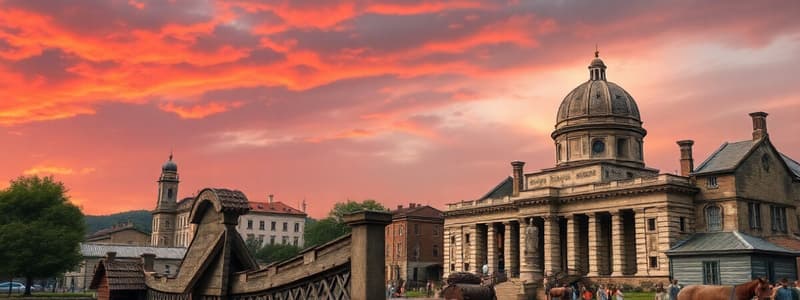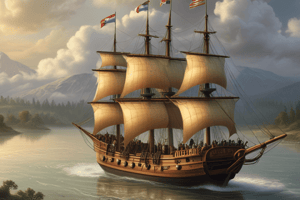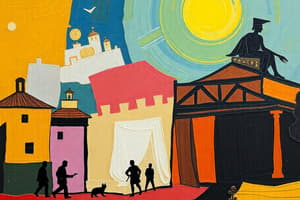Podcast
Questions and Answers
What does the Greek word Historia mean?
What does the Greek word Historia mean?
Learning by inquiry
According to Xiao Chua, what is the root word of kasaysayan?
According to Xiao Chua, what is the root word of kasaysayan?
saysay
Match the following terms about objectivity and subjectivity:
Match the following terms about objectivity and subjectivity:
Obhetibo = Has evidence Subhetibo = May be right or wrong
Which of the following are types of primary sources? (Select all that apply)
Which of the following are types of primary sources? (Select all that apply)
A diary is considered a primary source.
A diary is considered a primary source.
What is an example of a memoir?
What is an example of a memoir?
A primary source produced by governments is known as an ______.
A primary source produced by governments is known as an ______.
What type of source is an artifact?
What type of source is an artifact?
What does kasaysayang oral refer to?
What does kasaysayang oral refer to?
Study Notes
History’s Meaning
- History comes from the Greek word Historia, meaning "learning by inquiry".
- It studies the past and its impact on the present.
- Inquiry refers to knowledge gained through investigation.
The Filipino Word for History: Kasaysayan
- The word kasaysayan comes from the root word saysay, with two meanings:
- Narrative
- Meaning, significance, or importance.
Objective vs. Subjective
- Objective knowledge is based on truth and supported by evidence.
- Subjective knowledge is based on opinion and may be right or wrong.
- Objective knowledge is associated with facts that exist outside the human mind.
Bias Towards Objectivity and Subjectivity
Objective
- Difficult to achieve
- Superior
Subjective
- Inferior
- Prone to bias
- Untrue.
Multiperspectivity
- Recognizes the diversity of society.
- Appreciation of this diversity leads to accepting changes in historical interpretation.
Historiography
- The study of historical writing.
- Historians are called historiographers.
- Historians are interpretative and descriptive.
Primary and Secondary Sources
- Primary sources are firsthand accounts.
- Secondary sources analyze and interpret primary sources
Types of Primary Sources
- Written:
- Documents with reports, data, opinions, perspectives, and feelings.
- Unwritten:
- Physical objects.
Written Primary Sources
Diary/Journal
- Narrative of events witnessed by the author.
- Example: The Diary of General Gregorio del Pilar.
Autobiography
- Author’s account of their life.
- Focuses on significant life events, people, and experiences.
Letter
- Written to a specific person.
- Contains messages, opinions, feelings, and thoughts.
Newspaper
- Covers current events, including political, economic, and social issues.
- Includes expert opinions and perspectives.
Memoir
- Personal thoughts on a particular event in the author’s life.
- Example: Philippine Revolution by Apolinaryo Mabini.
Reports
- Officially written documents from a group of people.
- Provides information about an event.
- Used for investigations and hearings to inform government action.
Speech
- An individual’s thoughts expressed in a speech.
- Delivered for important occasions, gatherings, ceremonies, and political events.
Official Documents
- Government-published materials such as documents, announcements, and mandates.
Gaceta Oficial
- Legal documents created by Congress and signed by the President.
- Includes court rulings, government agency letters, and other essential documents.
Agreements
- Agreements signed by leaders or organizations.
- Example: The Biak-na-Bato Agreement.
Unwritten Primary Sources
Artifact
- Objects excavated by archaeologists from ancient times.
- Reflect the culture of the time.
- Also known as likha.
Relics
- Remains of living things, including humans, animals, and plants.
- May contain bones or footprints.
- Found in caves or rock formations.
Oral History-----------------------------------------------------------------------------------------------------------------------------------------------------------------------------------------------------------------------------------------------------------------------------------------------------------------------------------------------------------------------------------------------------------------------------------------------------------------------------------------------------------------------------------------------------------------------------------------------------------------------------------------------------------------------------------------------------------------------------------------------------------------------------------------------------------------------------------------------------------------------
- Spoken words, stories, narratives that can be broadly or narrowly sourced.
- Examples: Folktales, epics, proverbs, riddles, and stories.
Pictures and Drawings
- Creations made using knowledge and technology.
- Evidence confirms the presence of people in a location or documents an event.
- Example: Spolarium by Juan Luna.
Studying That Suits You
Use AI to generate personalized quizzes and flashcards to suit your learning preferences.
Related Documents
Description
This quiz delves into the essence of history, exploring its meaning and significance. It highlights the difference between objective and subjective knowledge, as well as the importance of multiperspectivity in historical interpretation. Test your understanding of these fundamental concepts in historiography.




